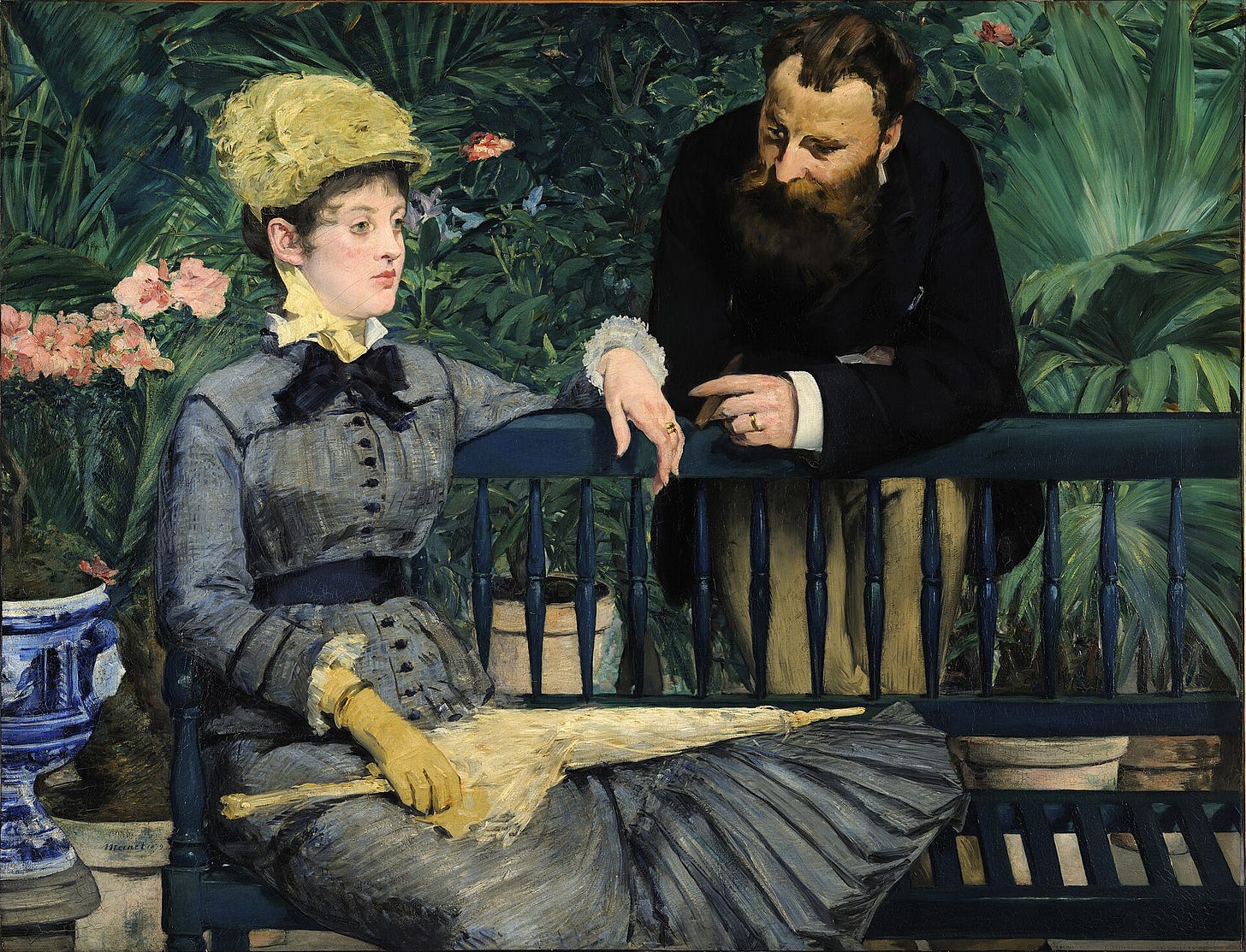How to start a conversation in French
How to really answer “Comment ça va ?” and “Quoi de neuf ?” like a native
At the start of every class, I greet my students with a big smile:
« Salut ! Comment ça va ? Quoi de neuf ? »
And almost every time, I hear the same reply:
« Ça va. Rien. »
Okay… technically correct.
But come on — is that really the best you’ve got?
French people love to play with language and when it comes to talking about how we feel or what’s going on, we don’t settle for a boring old “ça va.”
Whether we’re full of energy, totally exhausted, annoyed by the weather, or just feeling meh, there’s a way to say it and sound like a real native.
Today, let me show you how to break out of the “ça va” rut and level up your French with real, colorful, everyday expressions.
Ready to spice up your conversations?
Get premium access to read the full article and unlock extra perks .
Édouard Manet, Dans la serre (1879)
Pourquoi varier ses réponses ?
Parce que ces deux questions – « Comment ça va ? » et « Quoi de neuf ? » – sont des occasions de conversation.
Varier vos réponses, c’est :
✔️ Montrer vos émotions
✔️ Créer du lien
✔️ Sonner plus fluide, plus français
Quand tout va bien
Voici des expressions à utiliser quand vous êtes de bonne humeur :
Très bien, merci. – Very good, thank you. Polite and universal.
Super ! – Super! Energetic and casual.
Top ! – Great! Modern and simple.
Nickel ! – Perfect! Slang, very common in everyday speech.
Je suis en pleine forme ! – I’m full of energy! Natural and optimistic — often used in daily life.
Je pète la forme ! – I feel amazing! Very informal.
Tout roule. – Everything’s going smoothly. Relaxed and confident.
Tranquille. – All good. Casual and chill.
Ça gaze ! – Everything’s going great! (a bit retro)
Je vais à merveille. – I’m doing wonderfully. (very formal)
Quand ça va moyennement
Si votre journée est "moyenne", montrez-le :
Ça va. – I’m okay. (basic, neutral)
Comme ci, comme ça. – So-so. Old-school charm — not used as often today.
Moyen. – Not great, not awful. Honest and to the point — sounds a little flat.
On fait aller. – We’re getting by. (very French!)
Bof… – Meh. (often said with a shrug)
Pas terrible. – Not so great. Soft negative — useful when you don’t want to complain.
J’ai connu mieux. – I’ve seen better days. (a bit ironic)
Mouais, ça va. – Yeah… kind of okay.
Quand ça ne va pas
Exprimer son mal-être, c’est aussi parler comme un vrai natif :
Pas trop bien. – Not feeling great. Direct but polite.
Je suis crevé(e). – I’m exhausted. Physical fatigue, very common.
J’ai un coup de mou. – I’m feeling low. Mental fatigue or lack of energy.
C’est pas la grande forme. – Not in top shape. Slightly discouraged.
J’ai le moral dans les chaussettes. – Feeling really down. A very French, colorful expression.
Je suis à plat. – I’m drained. Neutral but negative.
J’en ai marre. – I’m fed up. Frustration or emotional overload.
C’est la cata. – It’s a disaster (catastophe). Often exaggerated but widely used.
C’est la loose. – It sucks. Very informal and a bit youthful.
Je traverse une période difficile. – I’m going through a tough time. Formal and serious.
Le moral est en berne. – I’m feeling low. Formal, often used in writing or professional contexts.
Et pour retourner la question ?
Ne vous contentez pas d’un simple « Et toi ? ».
Voici quelques alternatives plus naturelles :
Et toi, comment tu vas ? – And you, how are you doing? Warmer and more personal than just “Et toi ?”
Et toi, ça roule ? – And you, all good? Casual and friendly, great between friends.
Et de ton côté ? – How about you? Neutral and smooth — works in most situations.
Tu tiens le coup ? – Are you hanging in there? When you know the other person might be going through something.
Et quand on vous dit : « Quoi de neuf ? »
C’est une question très utilisée à l’oral et très appréciée par Bugs Bunny « Quoi de neuf docteur ? », équivalente à “What’s new?”. On attend ici une petite nouveauté, une mise à jour, même simple !
💎 Get premium access to continue reading the article and unlock extra perks — More info here




